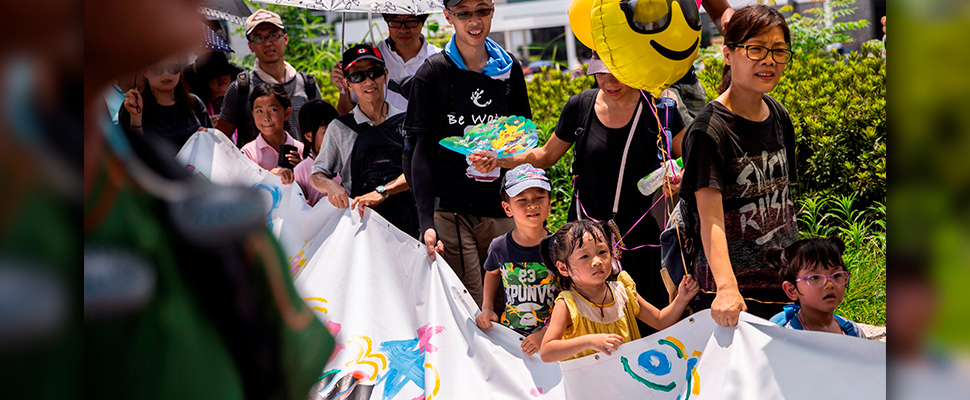Toddlers and pensioners join Hong Kong weekend protests

Demonstrators hold a banner during a march themed ‘Guard Our Children’s Future’ in Hong Kong, China, 10 August 2019. EFE/EPA/CHAN LONG HEI
EFE | Shirley Lau
Listen to this article
Leer en español: Niños y pensionados se unen a las protestas en Hong Kong
Campaigners of all ages, from toddlers to pensioners, took to the streets of Hong Kong in a flurry of anti-government protests across the city on Saturday
The Asian financial hub was preparing for another chaotic weekend after two rallies took place in the morning, involving elderly people and parents with their children.
They were followed by an afternoon march in the suburban town of Tai Po, which was not authorized by the police.
The events took place a day after Hong Kong’s leader Carrie Lam called for citizens to set aside their differences to “bring back order and say no to chaos or violence”.
She added that violence and obstructions by a small minority of people with no stake in society had caused huge damage to the economy.
It was the tenth weekend of protests which were originally sparked by a controversial extradition bill proposal.
Scores of elderly people started the day with a gathering in Wan Chai on Saturday morning.
They marched to various government offices, including the police headquarters and the office of the Hong Kong chief executive, to submit petitions condemning the administration for ignoring people’s demands and the use of excessive force by police.
Around an hour later, hundreds of parents, mostly in their 20s to 40s, emerged at Edinburgh Place square with their children for a rally “Guard our children’s future”.
Braving hot weather and sweating profusely, the marchers, including young children and a handful of toddlers, walked to the government headquarters and chanted slogans, such as “The government is lazy, people are unhappy”.
One boy Isaac, 11, told Efe why he joined the march with his mother.
“I want to do something for Hong Kong and cheer on Hongkongers," he said.
"People have staged so many protests but Carrie Lam has been turning a deaf ear to them.
"Some policemen are good but some are naughty".
Also read: German President warns of the internal and external challenges of the EU
"They are violent and hurt people with teargas and rubber bullets.”
Scores of activists returned to Hong Kong International Airport for the second day of an unauthorized sit-in, which aims to raise awareness among international travelers about the anti-government movement that has been rocking the semiautonomous Chinese city since early June.
Around 100 demonstrators had spent the night in the airport’s arrivals hall, after kicking off the sit-in Friday afternoon without causing flight disruption.
By Saturday afternoon, the crowd had swelled to around 1,000.
Many carried signs, posters and brochures with messages about Hong Kong designed for foreign visitors.
The potential flashpoint of the day was at Tai Po, where a march banned by police attracted more than 1,000 people.
The demonstrators included children, youths and elderly people, and there was no police presence in the area.
About an hour into the peaceful walk, the crowd split up, with some heading to a metro station while dozens of others marched to a police station, leading to a standoff with riot officers.
At around 6 pm, some protesters wearing all black moved to the nearby towns of Sha Tin and Tai Wai, where they blocked a roundabout.
At the other end of the political and social spectrum, hundreds of people joined a campaign initiated by the pro-government group Safeguard Hong Kong Alliance to visit police stations across Hong Kong in a show of support for officers.
Also read: From Asia to Africa: Women trafficked to Kenya's Bollywood-style dance bars
They waved Chinese national flags and chanted slogans including “Hong Kong police are the best” and “Your hard work is acknowledged”.
Hong Kong is in the midst of its worst political crisis in decades.
The controversy surrounding the now-defunct extradition bill, which would have enabled fugitives to be transferred from Hong Kong to mainland China to stand trial under the latter’s opaque legal system, has morphed into a broader movement seeking to reverse a decline in freedoms in the ex-British colony.
For the last two months, weekend protests have become the new norm for the city, and such events often devolve into intense confrontations between police and protesters as night falls.
As the government continues to refuse protesters’ demands, including the complete withdrawal of the bill and the formation of an independent inquiry body to investigate alleged police brutality and misconduct, protests have turned increasingly violent, with both the police and activists getting more combative.
Another rally is due to be held in the city’s biggest park in Causeway Bay on Sunday.





